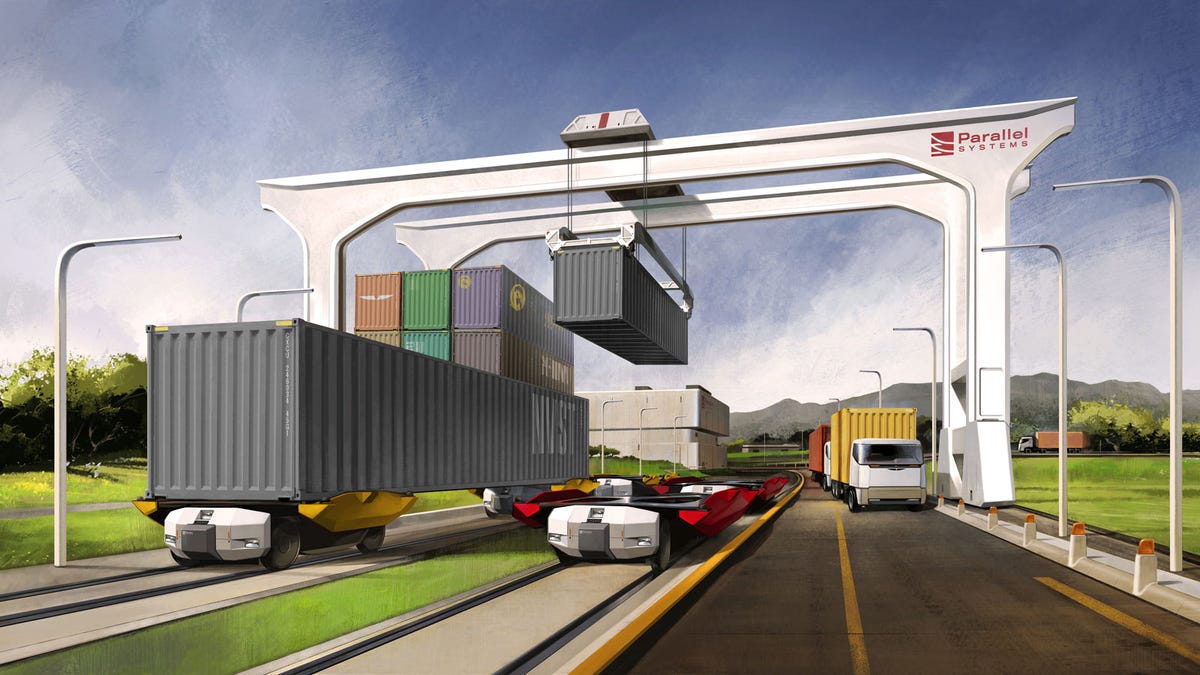Ex-SpaceX Engineers Create Self-Driving Trains To Aid Trucker Shortage

Parallel Systems’ self-driving trains can carry 2.8x as much stuff as a semi truck. Illustration: Parallel Systems
It’s a tough time to be a trucker. If you aren’t caught for days alone on the road, then you’re left with few benefits and low wages. It’s no wonder, then, that the U.S. is currently facing a shortage of long-haul truckers. But now, one firm thinks its self-driving freight trains could be here to save the day. Whether or not it actually works, though, will remain to be seen.
In order to try to combat the shortage of truckers around the world, a group of ex-SpaceX engineers has founded Parallel Systems. The firm is currently developing fleets of small, autonomous trains that could transport freight across the US.
The company has raised $49.55 million in funding to develop its swarm of miniature trains. The autonomous crafts travel in pairs to carry shipping containers across the country.
The company says it hopes the autonomous trains will be able to alleviate the strains places on long-haul truckers as its devices can transport large loads between cities or other transit hubs. Once at their final destinations, the loads can be transferred to trucks, where freight drivers will complete the last mile of the journey.
This way, the firm says truck drivers will be able to retain their jobs while working closer to home.
The Parallel Systems self-driving train prototype looks like its waiting to go for a walk. Photo: Parallel Systems
But, what makes these new crafts an improvement over current freight trains?
Well, with their reduced capacity, the smaller trains negate the need for enormous freight hubs outside city limits. Instead, Parallel Systems says its trains can deposit containers closer to where they are needed.
Also, instead of mile-long freight trains that can block traffic at rail crossings, the Parallel Systems trains can separate off mid-journey. That means emergency responders won’t get stuck waiting for an endless freight train to pass.
The trains also use camera-based autonomous driving tech to detect hazards on the tracks. Parallel Systems says they can then come to a stop 10 times quicker than traditional freight trains.
Swarms of self-driving trains could soon criss-cross the U.S. Photo: Parallel Systems
Well, now it’s all about their ability to carry much heavier loads than semi trucks.
Parallel Systems says each pair of its self-driving trains will be capable of carrying up to 128,000 pounds, which it claims is 2.8 times the capacity of a semi truck.
The trains will also reduce carbon emissions from the transport sector.
Each powered by a battery-electric permanent magnet motor, the trains will use 25 percent of the energy required to run a semi-truck and offer the lowest operational cost of any surface freight transportation mode.
What’s more, the self-driving trains will be able to cover 500 miles after a one-hour charge.
The firm has so far developed prototype vehicles, but it announced in January that it has raised the funds required to build a fleet of rail vehicles, execute advanced testing programs and grow the team.
So, what do you think? Will we see fleets of self-driving trains transporting our good across country soon? Or, is this another futuristic pipe dream we’ll never see come to fruition, destined to always be coming in “the next two years” until the world finally ends?



